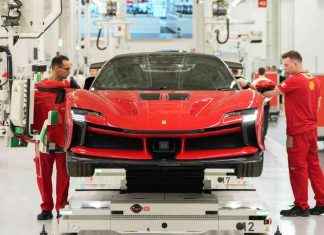Caption
Close
PHOENIX (AP) — When Intel’s CEO appeared at the White House last week to announce a revived effort to build a new factory in Chandler, he talked about the need for more favorable tax policies under the Trump administration.
The company also stands to get a big tax break at the state level under legislation introduced in Arizona designed to help big manufacturers like Intel.
Manufacturers are sitting on tens of millions of dollars in state income tax credits they can’t use because previous cuts in Arizona corporate income taxes favoring them leave them owing no tax here.
The legislation by Rep. Jeff Weninger, R-Chandler, would allow them to use those credits in other ways by getting cash refunds or money to offset sales-tax expenses when they invest in new facilities. Manufacturers would they only get half their credits back, the program is capped $10 million per year, and companies must agree to remain in Arizona for five years.
The proposal in House Bill 2492 is set for a committee hearing Wednesday. It also contains three other major incentives for big manufacturers like Intel, Raytheon, Honeywell and Boeing.
Weninger said the effort is needed to boost the state’s competitiveness. He noted increased competition from other states and nations and the need to work to attract and retain high-paying manufacturing jobs.
“We have to do whatever we can to remain very, very competitive with those other people,” Weninger said in an interview Friday.
The proposal was introduced just days before Intel CEO Brian Krzanich announced during a meeting with President Donald Trump last week that the company would invest $7 billion to complete a computer chip plant in Chandler. The plant has been vacant since it was built several years ago. The announcement echoed one Intel made in 2011 with former President Barack Obama that never came to fruition.
The plant is expected to be completed in three to four years and directly employ about 3,000 new workers.
The CEO indicated that the company was counting on a tax break under the new administration. “It’s really in support of the tax and regulatory policies that we see the administration pushing forward that really make it advantageous to be manufacturing in the U.S,” he said.
Weninger said his proposal isn’t linked to Intel’s announcement and had been in the works for months during talks with big manufacturing companies, including Raytheon, Boeing, Intel and Honeywell. “This is something that’s been going on for a long time, these companies all working together, all trying to figure out something where we can make Arizona more and more competitive,” he said.
But others believe Intel surely will be a major and early beneficiary.
“I don’t think there’s any doubt about that,” said Kevin McCarthy, president of the Arizona Tax Research Association. “They’ve got all the national news surrounding their expansion. There’s probably some link there.”
Three other incentives that would help Intel are wrapped into Weninger’s proposal.
One is a new jobs=creation program giving big companies about $3 million a year in tax rebates. The second creates a new sales tax exemption for supplies needed in manufacturing clean rooms, while a third lowers property taxes on new equipment already taxed at an ultra-low rate in special trade zones like the one Intel occupies in Chandler.
That and other provisions of the proposal trouble McCarthy, whose association generally opposes tax policies that single out classes of taxpayers because others have to pick up the tab.
“We have concerns about the breadth of this,” he said. “We definitely have concerns about the expansion of accelerated depreciation to Class 6 property. That much I know for sure, because (trade-zone) property applies to well more than the manufacturers who I know are advocating this.”
Our editors found this article on this site using Google and regenerated it for our readers.







